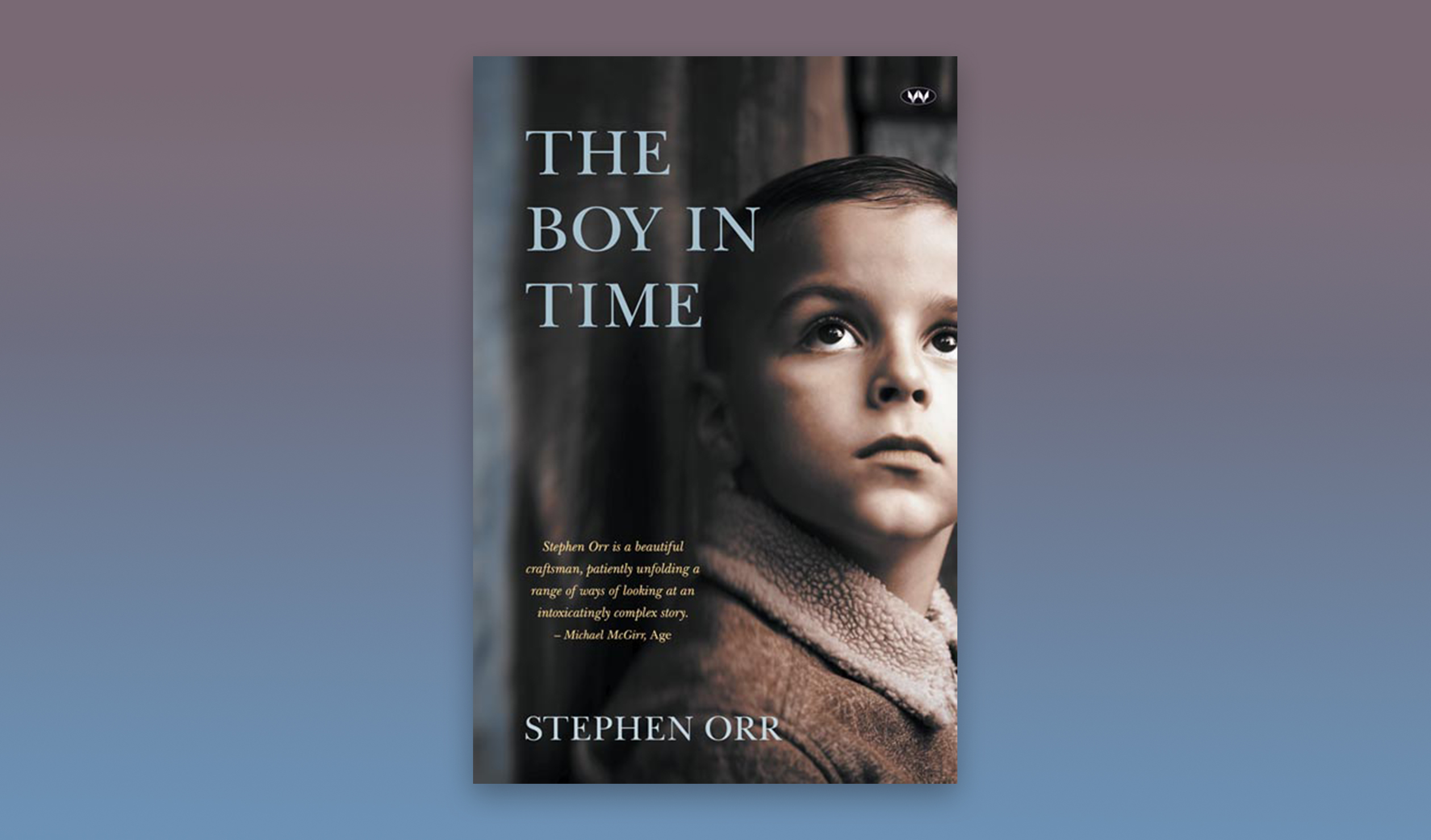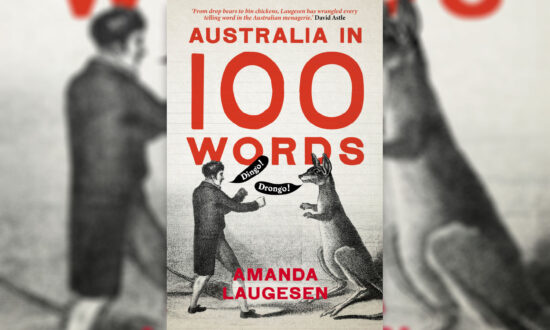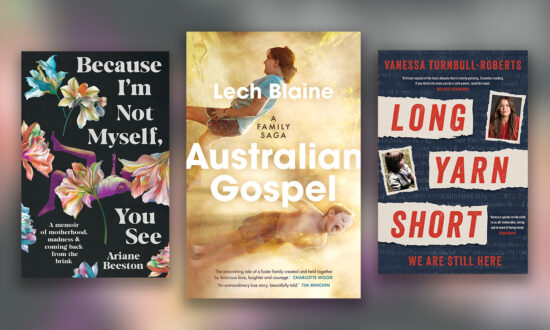Orr – whose previous books include the novels Time’s Long Ruin, The Hands, Sincerely, Ethel Malley and the story collection Datsunland – says in his introduction to The Boy in Time that he has tried to include a cross-section of styles, including experimental, problematic and tragic.
“There are ghosts, sex, death and murder; the way in which… heaven and hell seem out of proportion; and children, cast into the horrors of the world we, and our old people, have made for them. The boy in time running for his life, wandering the desert, trying to make himself understood, survive.”
The story below is extracted from The Boy in Time with the author and publisher’s permission.
______
The budgerigar
I
Tom Joll. Eleven. Standing on the corner of Lily and Foreman Streets, holding an old copy of J.D. Salinger’s Nine Stories. Jeans, torn about the knees, and a T-shirt his brother, before he died in a motorcycle accident, gave him for his tenth birthday. Now, the top feels strange, creepy, but his mother still makes him wear it, tells him it has years left in it yet. Sometimes, Tom thinks, his mother values money more than people, and all of the things that go between them. A lot has gone between Tom and his brother, Joel. A lot. When Joel died, it was like the world ended and he, Tom, wouldn’t possibly be able to continue alone. But he has. Here now, standing on the corner of Lily and Foreman Streets, holding Salinger’s book. Worse than that, because when his brother died, Tom was so overcome by something (he couldn’t say what, still can’t) that he ran into Joel’s room, opened his window, his bird cage, then waited for his Australian budgerigar to fly out of the room, the house, his life. Almost like, he thought later, the budgerigar was Joel in bird form, a spirit, a ghost that he, Tom, wouldn’t allow to haunt him for the rest of his life. Standing at the window, watching it (all green and yellow) sitting on a branch of the oak tree in their front yard, until his mother came in, saw what was happening, slapped him on the back of the head and said, ‘Why on earth did you do that?’
So here he is now, on the corner of Lily and Foreman Streets, waiting. A pair of tourists walk by and he steps forward, shows them the book and says, ‘I can help … if you like?’
One of them, the man, says, ‘Leave it alone, kid. Don’t you think he’d like his privacy?’
Tom’s used to this, so he just shrugs, turns away, but the young man says, ‘Have you ever seen him?’
Tom lights up. ‘Yes, plenty of times. He comes into town, walks along here to fetch his mail and buy bread from Mr Franco and milk from … the supermarket, there, see, he always gets milk, he seems to need a lot of milk.’
But this doesn’t work, and the man and his wife (or girlfriend, or whoever she is) continue along.
Tom waits. It’s all just a matter of waiting. It’s money well spent. He charges five dollars, but people usually haggle him down to four, three, a dollar, perhaps, but he doesn’t care. It all adds up. He keeps his earnings in a shoe box under his bed and, one day soon, will have the $52 he needs. Then it’ll be set right. Then. As he looks up, sees a tall man, a long, box-shaped face, like his head had once been full of groceries but now is just a head. And a nose like a boxer’s nose, like it’s been hit once too often. He watches this man coming towards him, and he watches how he’s staring at him, interested in something. He seems familiar. Why does he seem familiar? As he clutches the book in his sweaty hand (it’s ninety-one degrees), rolls it and unrolls it, flattens it, puts it in his pocket, takes it out, but this man is just watching him. He’s heard. First, they offer you candy, then they ask if you’d like to come back to their place to see their comics, then they say they’ve got the very first Superman, then you go with them, then they lock the door behind you and a week later your posters are up around town and people are stopping and chatting and saying, ‘Tom Joll, you remember him? Nancy’s boy. Joel’s brother. He used to stand there, right over there, offering to show people where Jerry lived.’
So he watches this man closely, and the man stops and says, ‘You’re the boy?’
‘What boy?’
‘The boy who charges five dollars to show people where Mr Salinger lives?’
Tom still isn’t sure. Why would one of those sort of people start off like this, in the middle of Foreman Street, with everyone watching? But he seems familiar. And Tom, this scrawny, underfed, overslapped budgerigar of a boy, tries to think why the man with the box head and the broad shoulders and the long, bony arms is asking him this. So he says, ‘Would you like to see?’ Because maybe this man is some sort of Salinger reader, or fanatic (people seem obsessed with him – why, he can’t say, because he’s never read one of his books, despite having a Nine Stories and The Catcher in the Rye that Joel stole from the school library). People come all the way from New York, California, Germany, England, Australia, even, to catch a glimpse of the writer. Fanatics! So why shouldn’t he, Tom Joll, poor, underfed kid, take advantage of the opportunity? Why shouldn’t he provide a service? It’s not like he’s taking them in to Mr Salinger’s house. Taking them to the front door and knocking and greeting the great man (who, truth tell, he’s never seen) and saying, ‘Mr Salinger, I’d like to introduce you to Jack Dawes from Australia who’s read all of your books and thinks you’re the greatest writer in the world.’ No. None of this. He’s keeping his distance. Thirty yards back. Moving some bushes. Indicating. That’s it. How’s that disturbing anyone’s privacy?
The man (wearing slacks, a jumper, even on a day like this) with the big paddle hands and long fingernails says, ‘Okay, then, how much do you want?’
‘Five dollars.’
The man stops, thinks, stares at the boy (God, maybe he’s an undercover policeman!), then says, ‘Fine.’ With a wry smile.
Tom holds out his hand for the money but the man says, ‘Only after you show me.’
‘Half now, half then.’
‘I only have a ten … I’ll give you ten, if you show me.’
Tom thinks, Okay. Ten. Usually they barter down, not up, but he doesn’t care because he can use the money to buy the budgie (that’s what they call them in Australia) faster. Then he holds up the book and says to the man, ‘Have you read this?’ And he says, ‘Several times.’ Tom says, ‘Is he your favourite writer?’ The man says, ‘Not particularly. He’s very ordinary. But since I’m here, I might as well see where he lives.’
II
They set off past the kindergarten, the nursing home, the automotive shop that’s recently closed, the fabric shop, a whole lot of shops, across a small playground, up a hill, past St Matthew’s, along a narrow and secluded birch-lined path. Tom thinks if this man’s a child molester he might act now, but ten dollars is so much money, and without Joel’s money (working at the pet shop) there’s not so much around to spend now. That’s why he’s hungry, he wants to tell this man, wearing loafers, some sort of comfortable shoes; he wants to tell him ten dollars is a lot, and thanks, and you’ll enjoy seeing this, it’s something very few see, because Mr Salinger is very secretive, hides from the community. ‘The people in town won’t tell you nothing about Mr Salinger.’
‘Anything.’
‘Sorry?’
‘Won’t tell you anything. And why do you think that is?’ Struggling to get up an incline. Tom offers to help, but the man is more rugged than he seems, moves like a rabbit, like a soldier jumping out of his trench to attack the enemy.
‘I think Mr Salinger pays them money to keep quiet. Yes, I think that’s true. Why else would they not tell anyone?’
The man stops to pick a leaf from a bay tree, smell it, like he’s done this a thousand times before. ‘Maybe they just respect his privacy?’
‘Could be that, too.’ Continuing. ‘But what I don’t understand is why Mr Salinger hates people so much he wants to live alone and never see no one.’
‘Anyone. Maybe he’s tired of people? How they’re always on at him? Want something from him?’
‘Maybe.’
Tom is holding back branches so the man can pass through the undergrowth. ‘This is where me and Joel used to come to …’ But stops. Why tell him? Who is he? He doesn’t deserve to know, hasn’t paid enough for him to unload his whole life. So he decides to stop talking, wait for the money, go home and put it in the shoe box. But the man continues: ‘… used to come to …?’
Tom says it before he thinks. ‘We used to dare each other to see who could climb the highest …’ Gazing around for the tallest tree. ‘That one, I think.’ Indicating. ‘And Joel’d get to the top and look in nests and get eggs and take them home and keep them in cotton, in front of the fire, until they … then when they hatched he’d take them to work, his job, the pet shop, and they’d sell them. Twenty dollars each, Mr …?’
‘Glass.’
‘Mr Glass. Twenty dollars apiece, Mr Glass. And he’d give me five dollars to …’ Slowing. Stopping. Realising he’d given more than ten dollars’ worth.
‘And where’s Joel now?’
Tom stops, peers down a steep incline, realises, if you fell, it’d be unlikely you’d survive. But this is what he did, every day – led people along the path so he could get enough money to replace his brother’s budgie. ‘He’s dead.’
‘Your brother?’
Tom nods. Maybe it’d be best to take a few more steps.
‘That’s a shame, Tom.’
Tom doesn’t reply. It’s more than a shame. It’s shit. It’s very shit. Every day it’s shit. Every night, lying in bed, talking to no one instead of Joel. Shit.
‘Was he sick?’ Mr Glass asks.
‘No … someone didn’t wait for him to … on his motorcycle. A Kawasaki. He reckoned they were best.’
Mr Glass waits for more information, but Tom doesn’t want to tell him how Joel was late for work, how he sped off without even waking him, his brother, Tom, and saying goodbye, as he did most mornings, as he should have, if he’d been following the rules of life. No. None of that. Tom woke and his brother was gone and the breeze was blowing in his window and the budgie was chirping and his mother was in the kitchen making pumpkin soup and it was the most ordinary day ever. He, Tom Joll, doesn’t want to tell Mr Glass this. ‘Come on, we’re nearly there.’
Continuing. This is where they had to be careful because the path (as it was) passed through Mr Holland’s land and they had to go under a fence, through boggy marsh, another fence, then pass through the open where Mr Holland might be able to see them from his living room, and once, when he and Joel had done this, Mr Holland had come out shouting at them to get off his land.
Mr Glass stops, looks into the sky, wipes his face with a handkerchief, replaces it in his pocket and says, ‘It’s a lot of work for five dollars, Tom.’
‘What else would I be doing?’
‘Playing with your friends. Baseball?’ Shrugging, almost as though he couldn’t imagine what an eleven-year-old would be doing on a day like this.
‘I don’t care,’ Tom says. He stands studying Mr Holland’s place, a big, five or six bedroom house on the hill with gardens of red and white camellias that Mrs Holland enters in the Cornish show every year. ‘I gotta get $52, anyways, Mr Glass.’
‘Why?’
‘To buy a budgie.’
‘A budgie?’ Mr Glass laughs, bends over, places his hands on his knees to support his throaty chuckle, and Tom says, ‘What’s so funny?’
‘A budgie? A little bird? The little green ones?’
‘That’s it.’
And now Tom can’t help but smile.
‘You do all of this because you want a budgie?’
‘I don’t want one but … I have to have one.’
‘Why?’ From laughter to intrigue, a flash of light from behind the little bit of cloud left in the summer sky.
‘I just have to.’
‘But why?’
Tom still doesn’t want to tell him. Ten dollars only buys so much. Whatever it was between him and Joel should stay between him and Joel.
‘If you tell me, I’ll give you twenty dollars.’ And to make it clear, Mr Glass takes out his wallet, finds a twenty, holds it between his first two fingers, hoping, perhaps, Tom can smell it, taste it, or at least need it more than he can resist it.
‘I don’t want your money.’ And walks on.
III
They pass from Mr Holland’s land, and Mr Glass (still holding the twenty) says, ‘There must be an easier way to get to Mr Salinger’s house?’
Tom shrugs again. There is. But he likes coming this way. He likes the forest and how it’s always cooler than the fields; he likes the rustle of leaves; the sound of people harvesting grass with mowers. He likes the country. ‘If I had a million dollars I’d buy a farm and be a farmer.’ He glances back. He’s sure, now, this man isn’t one of the men who keep children in their basement. He doesn’t look like that. Whatever that is.
‘What type of farmer would you be?’
Tom likes this question, can’t help himself, says, ‘A bird farmer.’
‘How can you farm birds?’
‘You can. I’ve seen it on television. You build a big aviary and fill it with girl birds and boy birds of every type and you make millions, well thousands, maybe hundreds of birds. That’d be best. And I’d have all of the birds I want.’
‘I have a bird.’
Tom stops and says is it a budgie, though he knows almost no one has an Australian budgerigar, and Mr Glass says it’s just an old finch called Seymour, and he’s got patches where he’s always working at himself. Old and run-down, like me, Tom.
Tom thinks that doesn’t sound good at all. A budgie would be better. That would solve everyone’s problems.
But it doesn’t matter, because they’re nearly there. They climb a hill covered in rocks and grass and stray old bushes with rabbit droppings everywhere, and Mr Glass says, ‘It’s almost impossible to get rid of the rabbits, isn’t it, Tom?’
‘I guess.’ He stops. ‘Are you going to give me the twenty?’
‘Yes.’
‘Can I have it now?’
‘Ah.’ The same smile. ‘I still haven’t seen Mr Salinger’s house.’
So Tom runs up the hill and calls for Mr Glass to keep up and Mr Glass struggles, but manages, because although he’s old he’s not so old he can’t get up a hill. When they’re nearly at the top, Tom stops and points at a big, brown wooden house that overlooks the valley and says, ‘There it is.’
Mr Glass takes a moment, looks, says, ‘Are you sure?’
‘Yes.’
‘How do you know?’
‘Everyone knows … well, some people know, and Joel knew, and he brought me here to show me and he told me that Mr Salinger is the most famous writer in the world but no one has ever seen him cos he never comes out of his house and he’s like a …’ Making a big, fat, full face of a monster. ‘Some sort of ghoul.’
‘A ghoul?’ The same laugh. ‘So it definitely is Mr Salinger’s house?’
‘Yes.’
‘And if we waited here long enough we’d see him, this Mr Salinger?’
‘Yes, definitely.’
‘And you’d know what he looks like?’
‘No, no one’d know.’
‘But you said …?’
Tom stops to think.
‘So why don’t we go and see him?’ Mr Glass grabs the book from Tom’s pocket, Tom reaches for it, but Mr Glass is too tall. ‘Come on.’ The old man emerges from the bushes, strides up the hill with long-legged steps Tom hasn’t seen so far on the hike. Tom follows him, calling, ‘No, stop, we’re meant to respect his privacy!’
‘Who cares about that? I’m sure he’s got a few minutes spare to talk to me about’ – checking the book – ‘Nine Stories.’
Tom runs faster, gets in front of Mr Glass and says, ‘He gets so angry. Furious. You don’t want to!’
Mr Glass waves the twenty dollars in Tom’s face.
‘He just wants to be left alone. He doesn’t like people, for some reason.’
‘No?’
‘Something happened and now he hates all people and never comes out of his house and if you do this, if you go to his door … you shouldn’t, Mr Glass. You should do what he wants. You should …’ Out of breath.
But Mr Glass says, ‘Nonsense.’ He continues up the hill, onto the porch with an old Buddha and a tray of sliced apricots the birds have eaten, approaches the door and calls to Tom, ‘Come on, Tom. We’ve come all this way.’
Tom holds short. It’s one thing to look from a distance, but this isn’t right. What if something bad has happened to Mr Salinger? What if that’s why he wants to be left alone? What if his brother died, too, and he never got over it and misses him and cries for him every day but can’t have him so he just sits in his house wishing it hadn’t happened like this, wishing he’d said goodbye, wishing the truck had given way, wishing after, he’d not blamed his mum and gone into Joel’s room and let the budgie go free.
But there’s Mr Glass, on the porch, and he knocks on the door and says, ‘Come on, Tom, I’m sure he’s not as horrible as you think. I’m sure he’s decent, don’t you think, Tom?’
Tom doesn’t know. He stands in front of Mr Salinger’s house wondering if he’s inside and if he can see him and if he’s getting angrier and angrier and ready to come out and shout and scream and maybe even hit him or Mr Glass.
‘Tom?’
‘We oughtn’t.’
‘Why not?’ The same laugh. ‘You’re a remarkable young man, Tom.’ This time, not so much a laugh as a smile, and Tom thinks and thinks and remembers and runs up onto the porch and reclaims the book and looks at the picture on the back cover.
But it doesn’t matter. Mr Glass gives him the twenty and says, ‘It’s not a budgie, I know, but if you want to take Seymour, he’s yours.’
______
The Boy in Time, by Stephen Orr, is published by Wakefield Press.
Support local arts journalism
Your support will help us continue the important work of InReview in publishing free professional journalism that celebrates, interrogates and amplifies arts and culture in South Australia.
Donate Here




